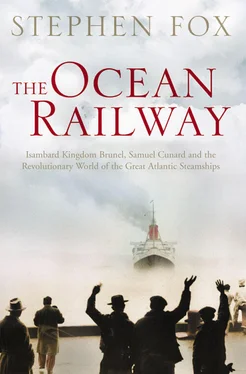A recurring drama of initiation awaited those crossing for the first time. The first few days at sea might seem deceptively tranquil. No prior experience of the ocean from the vantage point of a beach or an offshore boat could adequately prepare a neophyte for the North Atlantic in full cry. In November 1835, Fanny Appletonof Boston (the future wife of Henry Wadsworth Longfellow) embarked on the packet Francis Depau for Le Havre. Eighteen years old, bright-eyed and curious, she dismissed the fourteen other passengers as ‘well meaning, uninteresting folks’ but liked watching the sailors and the shifting sea. Commanders often managed to find time for pretty young women on board their ships; so Captain Henry Robinson gave her a puzzling lesson in navigation and ‘shooting the sun’ with his sextant at noon to find the Depau’s position. Five days out, running before a brisk following wind, the ship dashed along at ten knots, prancing like a sea horse. ‘What a glorious exhilaration in this fine sea-air, a reckless thought-defying sense of liberty and life,’ Appleton wrote in her journal, with the joy of a cosseted young woman now perceiving a wider world. ‘The exhilaration of our speed fills us with a mad glee…we run and shout.’
The wind continued as the sea got rougher. Still bowling along at ten knots, the ship pitched and rolled and tossed. Appleton felt dizzy and exhausted, had trouble dressing, and – one week out – started longing for land. After a miserable night, she ‘wondered where the romance of the sea was found – certainly not below the deck’. She wept in despair. The steward brought tea. The constant motion and cacophony of wind, sea and shipboard sounds kept her from reading and writing. ‘Oh this eternity of noise and motion stupefying the brain, exhausting the body. Truly a shipboard life teaches one…humility: we are brought to our lowest ebb of self-respect.’ Her mood fluctuated wildly for the rest of the trip, depending on the weather. Like many sea diarists, she gradually ran short of fresh material and made briefer entries as the journey dragged on. Other passengers expressed surprise that she could still write so much about so little. ‘I am determined to prove one can write a Journal at sea,’ she vowed – and then left three straight days blank. (‘Little worth recording,’ she noted.) The ship reached Le Havre after twenty-five days, none too soon for Fanny Appleton.
Most of the cabin passengerson packets were men: British textile merchants and army officers, and American businessmen. Thrown together at close quarters amid the Anglo-American political tensions of the time, they sometimes bristled at each other. More typically, as frequent transatlantic travellers they settled amicably into the shipboard routines they had come to know well. In this quite masculine atmosphere, isolated by time and circumstances, they could dress casually and indulge at will in boyish recreations. ‘ We endeavoredto amuse ourselves as best we could,’ one man noted, ‘and, for the want of work, turned boys again, and went to play.’ They shot rifles at random targets in the rigging, sang songs, made bets, played cards and games, held mock courts, told jokes and stories; they drank all day long. Even the tightly buttoned Ralph Waldo Emerson, on the Black Baller New York from Liverpool in 1833, succumbed to shipboard spirits. ‘ These arethe amusements of wise men in this sad place,’ he decided. ‘I tipple with all my heart here. May I not?’ In midsummer 1832, the English actress Fanny Kemble, bemused and amused, watched the men on a packet in a festive Saturday-night mood of drinking, dancing, singing, and romping around on the quarterdeck at the stern. They toasted their absent wives and sweethearts, in the tradition of sailors. The captain proposed ‘The Ladies – God bless them’. (‘And the Lord deliver us!’ someone added.)
The most promisingly pleasant aspect of packet life available to all cabin passengers, drunk or sober, was the food. A housed-over longboat on deck held a three-tiered menagerie: sheep and pigs on the bottom, then ducks and geese, and hens and chickens on the top. The ship’s cow lived in another structure nearby, not happily. These animals provided fresh meat, eggs, milk and cream for the laden plates in the dining saloon. On the Black Ball’s Europe in 1833, breakfast consisted of ham, eggs, bacon, mutton cutlets, shadfish, rolls and cognac. Dinner ran to three comparable courses, good pastries, seven kinds of alcohol, and dried fruits for dessert. The long, rolling swells of the North Atlantic left many passengers unable to eat or hold down their meals; but whenever circumstances allowed, especially during the early weeks of the voyage, the food and drink were generous.
Except for the Le Havre lines, which brought over thousands of German immigrants to America, the packets carried few steeragepassengers until after 1840. During the first two decades, steerage business in general was just an afterthought; if a packet didn’t fill the ‘tween-deck’s upper hold with fine freight, the ship’s carpenter would fashion temporary bunks of rough, unplaned lumber, and the steeragewould take on human cargo at twenty dollars a head. That fare paid only for the cramped bunk and a place on deck to cook. Steerage passengers had to bring their own food, pots and pans, and plates and utensils. The tightly packed steerage became a fetid horror at night and in bad weather. Two small ventilating hatches had to be closed in rain or heavy seas. The steerage air mingled a stifling bouquet of foul bilge water, rotting wood and ropes, and human sweat, vomit and excrement. At times these closed-down conditions went on for days, getting worse until the storm lifted.
Everybody, cabin and steerage passengers alike, felt better up on deck. There one could breathe fresh air and take walks, play shuffleboard, and watch the sea and the other passengers. A dampening shipboard rhythm of ennui and lassitude gradually settled onto the company. Earnest intentions of reading, writing and needlework were laid aside, and people lounged away the time. Even the most trivial daily events – meeting and (after due inquiry) identifying another ship, sighting a whale or porpoise, or discovering a stowaway – took on gripping, inordinate significance. Wagers were placed on the daily run and the date of arrival. After evening tea, the dining saloon might hold lectures, charades, rounds of whist and singing. A bold man could even venture, trolling, into the ladies’ cabin. ‘ This snuggeryaffords tolerable convenience for a little flirtation, ’ noted the Irish actor Tyrone Power, ‘if you are lucky enough to get one up.’
On clear nights, far from the obscuring lamps of shore, and in the prevailing deprived mood of being easily diverted, passengers seized on natural light shows. The sun would fall into the western horizon, a blazing ball that slowly guttered out as though being submerged in the sea. The moon would rise, never before so distinctly. Stars filled the sky, brighter and denser than when seen from land. Whole new constellations revealed themselves to the naked eye. In every direction, the sky arched all the way down to the horizon. Shooting stars zoomed around this vast inverted bowl, and the aurora borealis looked deeper and more brilliant in its roses and purples. From the Europe in 1835, cruising along at nine knots, Anna Eliot Ticknorof Boston watched the phosphorescence tossed up by the bow. The foam at the stern glittered like diamonds. Distant waves broke and lit up. Porpoises darted around, leaving trails like seaborne comets. The sails and rigging glowed. It was all so wild and beautiful.
People stayed up late because sleeping was so difficult. After the sumptuous meals and lounges, the private sleeping quarters inevitably disappointed: small, unheated, dimly lit, and poorly ventilated. ‘ About as bigas that allowed to a pointer in a dog-kennel,’ the English novelist Frederick Marryat groused. ‘I thought that there was more finery than comfort.’ The berth, generously called a bed, offered thin sacking over boards and a hollow down the middle that was supposed to hold the occupant in place. Emerson’s sides grew sore from rolling back and forth. ‘ Oh for a bed!’ Fanny Kemble keened. ‘A real bed! Any manner of bed, but a bed on shipboard!’ Settled down for sleep, a passenger could not miss the remarkable, unexpected variety of noiseson a wooden sailing ship. The waves kept up a steady background of thumps and pulses, generating constant small motions in the seams of the hull, flexing and twisting, which caused sharp creaking sounds in the jointed woodwork of bulkheads, cabin partitions and steerage bunks. Passengers lay awake in their berths, trying not to hear. The animal barnyard overhead maintained a running, distressed commentary. The mates and sailors yelled back and forth, their footfalls thuddingly heavy at night, as they changed sails and scraped down the deck with screeching holystones. Wind whistled through the rigging. Morning could take a long time coming.
Читать дальше












